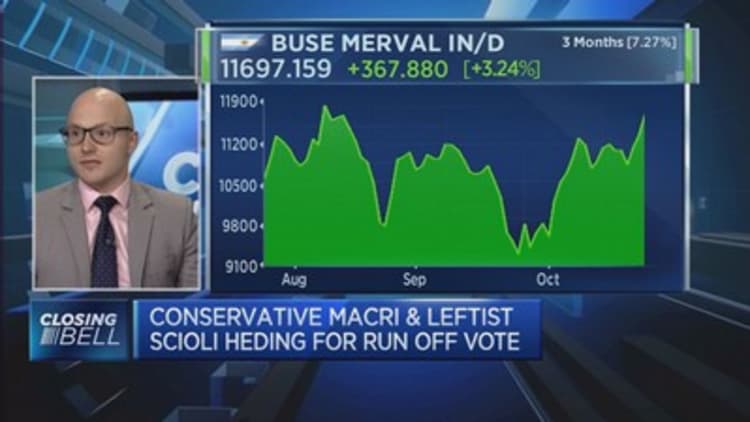
While a fractious U.S. Congress debates raising the Treasury's debt ceiling, corporate debt holders may be in line for some good news from abroad.
Elections in Argentina this weekend heralded the end of the eight-year rule of President Cristina Kirchner. Analysts forecast this will progress negotiations between authorities and hedge funds in New York that remain unpaid since the country's massive default in 2002.
Who will lead Argentina yet is unclear, with a run-off between Kirchner-backed socialist, Daniel Scioli, and pro-business candidate, Mauricio Macri, set for next month following a neck-and-neck result on Sunday.
However, either man is likely to strike a more conciliatory line than Kirchner with so-called holdout creditors, who include hedge fund billionaire, Paul Singer.
"Whoever wins in this close race will break with the recent grim past. We expect Mr. Scioli to reverse Mrs. Kirchner's policies, as he has vowed to resolve Argentina's economic problems, including the long-standing problem with hold-out hedge fund creditors," said Andres Abadia, senior economist at Pantheon Macroeconomics, in a research note.
Argentina's 2002 default was followed by a subsequent one in 2014 and its intransigent stance with creditors has kept it locked out of global capital markets. However, rising funding needs are seen pushing both presidential candidates to scale back on capital controls and try to regain the trust of investors. Its economy is seen growing by a lowly 0.4 percent this year and shrinking 0.7 percent in 2016, according to the International Monetary Fund.
"If Scioli is elected, we think he would put in place actions to restore central bank liquidity and reduce the need to print (Argentinian) pesos to finance the fiscal deficit (the primary deficit is currently at 5 percent of gross domestic product). A settlement with the holdouts would facilitate these objectives, as it would open up capital markets to the republic, provinces, and corporate sector," Pilar Tavella and Sebastian Vargas said in a Barclays emerging market note.
"Scioli's to-be government officials and presidential advisers have also publicly supported a push for such an agreement."
— By CNBC's Katy Barnato. Follow her on Twitter @KatyBarnato.

